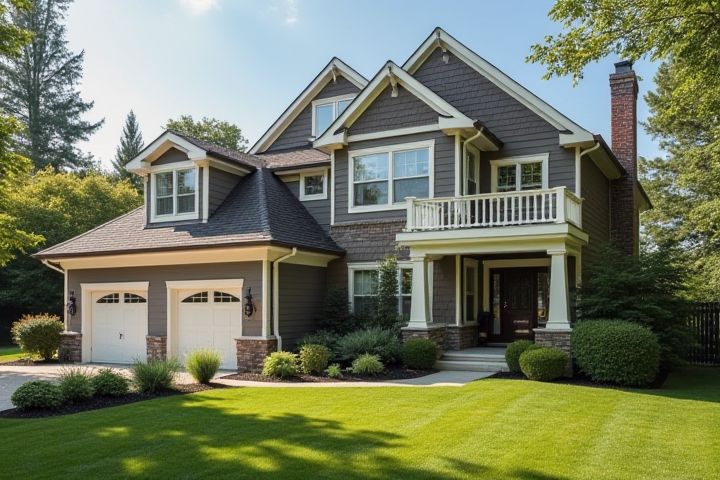
Flipping a house profitably involves several key steps, beginning with thorough market research to identify undervalued properties in desirable neighborhoods. It is crucial to develop a budget that accounts for purchase price, renovation costs, and any unforeseen expenses, ensuring a profitable return on investment. Prioritize high-impact renovations, such as kitchen and bathroom upgrades, which can significantly increase property value. Understanding local housing trends and buyer preferences can guide your design choices, making the property more appealing to potential buyers. Effective marketing strategies, such as staging and professional photography, can enhance the property's visibility and attract more offers, culminating in a successful flip.
How To Flip A House Profitably
Comprehensive market research
Comprehensive market research is essential for profitable house flipping, as it enables you to identify lucrative neighborhoods with growth potential. Analyze local real estate trends, property values, and competing listings to determine optimal purchase prices. Engage with local real estate agents for insights into buyer preferences and emerging areas that may yield a higher return on investment. By thoroughly assessing market conditions, you can make informed decisions that maximize your profits while minimizing risks in your house flipping venture.
Accurate property valuation
Accurate property valuation is crucial for flipping a house profitably, as it determines your potential return on investment. Utilize Comparable Market Analysis (CMA) to assess recent sales of similar properties in the area, focusing on factors like square footage, amenities, and neighborhood trends. Engaging a professional appraiser may provide more precise insights, often costing between $300 and $500, but can significantly enhance your valuation accuracy. Aim to purchase properties at 70% of the after-repair value (ARV) minus renovation costs to ensure a favorable profit margin once the flip is complete.
Detailed budget planning
Detailed budget planning is crucial for profitable house flipping, as it allows you to allocate resources effectively and anticipate expenses. Start by estimating purchase costs, including the property price, closing costs, and taxes; these typically range from 1-3% of the sale price. Next, itemize renovation expenses such as materials and labor, which can frequently consume 20-40% of your total budget; consider obtaining multiple contractor quotes to ensure accuracy. Lastly, factor in selling costs and potential holding costs, like mortgage payments and utilities, which can significantly impact your overall return on investment, highlighting the importance of comprehensive financial foresight in the flipping process.
Strategic location selection
Selecting a strategic location is crucial for flipping a house profitably. Research neighborhoods with a minimum of 5% annual property appreciation, which indicates growing demand. Access to amenities such as schools, parks, and shopping centers can significantly enhance property value, with homes in desirable areas typically selling for 10-20% more. Aim for locations with low crime rates and excellent public transport links, as these factors are increasingly prioritized by buyers, especially millennials.
Professional networking
Engaging in professional networking can significantly enhance your ability to flip a house profitably. Attend local real estate meetups or seminars to connect with experienced investors, contractors, and real estate agents who can provide valuable insights and resources. Utilizing platforms like LinkedIn or attending real estate investment groups will expand your network, which may lead to exclusive deals, partnerships, and referrals. By building relationships with professionals in the industry, you can access a wealth of knowledge and opportunities that could increase your overall return on investment.
Smart renovation choices
Smart renovation choices can significantly impact your profit margin when flipping a house. Prioritize modernizing kitchens and bathrooms, which yield average returns of 80% to 90% on investment. Opt for energy-efficient upgrades, such as LED lighting and ENERGY STAR appliances, to appeal to environmentally conscious buyers and lower long-term utility costs. Lastly, cosmetic enhancements, like fresh paint and landscaping, can dramatically boost curb appeal and attract higher offers, often increasing property value by 5% to 10%.
Cost-effective upgrades
Cost-effective upgrades, such as modernizing the kitchen and bathroom, can significantly boost a property's resale value. Consider investing around 5% of the home's total value on energy-efficient appliances, which can lead to a return of up to 15% on your investment. Simple enhancements like fresh paint, landscaping, and updated light fixtures can be accomplished for under $3,000 and attract potential buyers quickly. Focus on these high-impact areas to maximize your profits while minimizing expenses, ensuring your flipped house stands out in the market.
Efficient project management
Efficient project management is crucial for flipping a house profitably, ensuring that timelines and budgets remain on target. By creating a detailed project schedule, allocating a budget of approximately 10-15% for unforeseen costs, and coordinating tradespeople effectively, you can minimize delays and maximize returns. Regularly monitoring progress through weekly check-ins and establishing clear communication channels with contractors can enhance productivity and address issues swiftly. Prioritizing tasks such as renovations that increase market value, like kitchen and bathroom upgrades, can significantly boost your potential profit when selling.
Effective marketing strategies
Effective marketing strategies are crucial for flipping houses profitably, starting with high-quality photography that showcases the property's best features. Utilize online platforms like Zillow, Realtor.com, and social media channels, reaching over 70% of home buyers who begin their search online. Create compelling listings with detailed descriptions highlighting renovations and neighborhood benefits, such as proximity to schools and parks, which can significantly influence buyer interest. Hosting open houses can generate buzz and attract potential buyers, often resulting in quicker sales and competitive offers.
Understanding legal and tax implications
Understanding the legal and tax implications of flipping a house is crucial for maximizing your profits. Familiarize yourself with local zoning laws, building codes, and any restrictions that may impact renovations to avoid potential fines. It's essential to grasp the capital gains tax rules; for example, properties held for less than a year may incur a higher tax rate, typically around 15-20%. Consulting with a tax professional can help you navigate deductions on renovation expenses, thereby lowering your overall tax burden and increasing your net profit.
